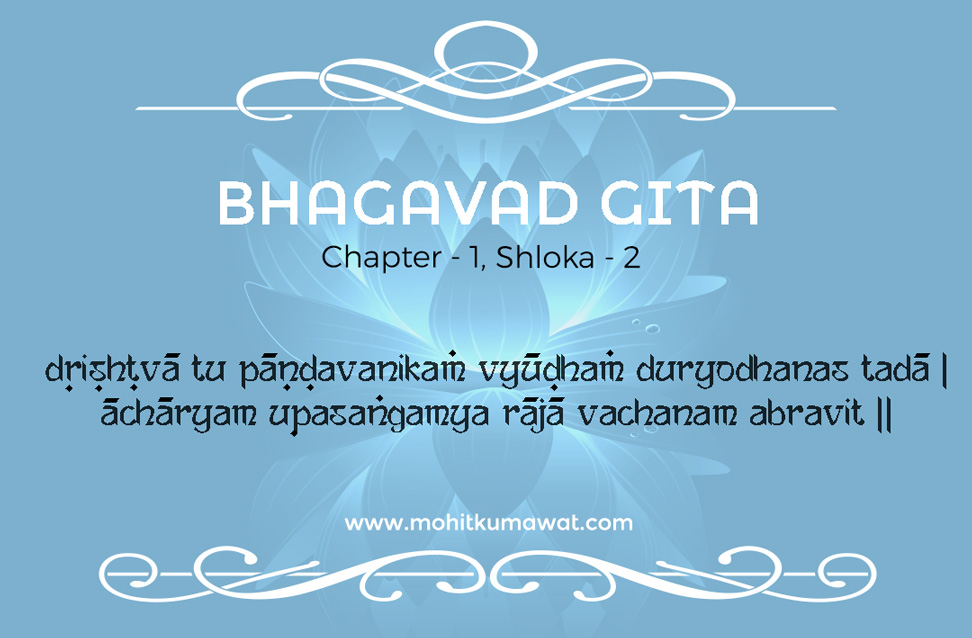
Bhagavad Gita – Chapter 1, Verse 2
Translation
TRANSLATION
Sanjaya Said:
O King, after looking over the army arranged in military formation by the sons of Pandu, King Duryodhana went to his teacher and spoke the following words.
PARAPHRASE
In Bhagavad Gita, Chapter 1, Verse 2, Sanjaya understood the motive behind the despondent king’s question. He wanted to encourage the king and assure him that his sons were in no way ready to make any sort of compromise under the influence of the Holy place of pilgrimage. Therefore, he informed him that his son, Duryodhana, went to Acharya Drona, the army commander-in-chief, to tell him about the position of the Pandava’s Army. Although Duryodhan stood at the king’s place yet, he had to approach his teacher to explain the seriousness of the cause.
Paraphrase
In Bhagavad Gita, Chapter 1, Verse 2, Sanjaya understood the motive behind the despondent king’s question. He wanted to encourage the king and assure him that his sons were in no way ready to make any sort of compromise under the influence of the Holy place of pilgrimage. Therefore, he informed him that his son, Duryodhana, went to Acharya Drona, the army commander-in-chief, to tell him about the position of the Pandava’s Army. Although Duryodhan stood at the king’s place yet, he had to approach his teacher to explain the seriousness of the cause.
Understanding Bhagavad Gita Chapter 1, Verse 2
Duryodhana’s actions reveal his character. We all know he was not righteous, and his heart was filled with greed, jealousy, and hatred, but above all, he possessed the qualities of a great politician. Through tactical politics, plotting, and treachery, he did his best to secure the throne of Hastinapur and Indraprastha for himself. Still, as it is often said, human plans are nothing compared to what the Supreme Being has in store for us.
In the current era ruled by Science and Technology, we all like to be reasonable, and we must be in order not to fall prey to the blind faith and superstitions prevailing all around us.
Dharma (Righteousness) should not be confused with religion. Religion is a set of guidelines, while Dharma is the logic and reason behind any Karma (Action).
Understanding Bhagavad Gita – Chapter 1, Verse 2
Duryodhana’s actions reveal his character. We all know he was not righteous, and his heart was filled with greed, jealousy, and hatred, but above all, he possessed the qualities of a great politician. Through tactical politics, plotting, and treachery, he did his best to secure the throne of Hastinapur and Indraprastha for himself. Still, as it is often said, human plans are nothing compared to what the Supreme Being has in store for us.
In the current era ruled by Science and Technology, we all like to be reasonable, and we must be in order not to fall prey to the blind faith and superstitions prevailing all around us.
Dharma (Righteousness) should not be confused with religion. Religion is a set of guidelines, while Dharma is the logic and reason behind any Karma (Action).

Let us make a metaphorical comparison of Dharma with Salt and Karma with Curry. Like salt on its own is unpleasant to the tongue, Dharma alone would seem undelightful. Albeit being salty, it is the most important flavour enhancer which determines the overall taste of the curry. Making salt a requisite in the culinary world. The same goes with Dharma, you can perform all your Actions (Karma) without it but they might not give you the joy or satisfaction. For every Karma to be ethical and in the interest of humanity, it should have a pinch of Dharma. Making Dharma a requisite in the Karmic World.
Such is the beauty of Bhagavad Gita – A Theistic Science. It talks about sense and offers an explanation for whatever we are dealing with in our lives.
Let us make a metaphorical comparison of Dharma with Salt and Karma with Curry. Like salt on its own is unpleasant to the tongue, Dharma alone would seem undelightful. Albeit being salty, it is the most important flavour enhancer which determines the overall taste of the curry. Making salt a requisite in the culinary world. The same goes with Dharma, you can perform all your Actions (Karma) without it but they might not give you the joy or satisfaction. For every Karma to be ethical and in the interest of humanity, it should have a pinch of Dharma. Making Dharma a requisite in the Karmic World.
Such is the beauty of Bhagavad Gita – A Theistic Science. It talks about sense and offers an explanation for whatever we are dealing with in our lives.
THEISTIC REALISM
Let us infer from Bhagavad Gita, Chapter 1, Verse 2. Duryodhana kept running after worldly pleasures. Through his uncle’s tactics and unjust efforts, he enjoyed those pleasures briefly. There is no point denying it. But did they last? He tried till the very end, eventually dying in the pursuit. And while he was enjoying his pleasures, the righteous Pandavas suffered in the woods many times. Still, they never strayed from the path of Dharma which offered them peace and prosperity in the end.
Theistic Realism
Let us infer from Bhagavad Gita, Chapter 1, Verse 2. Duryodhana kept running after worldly pleasures. Through his uncle’s tactics and unjust efforts, he enjoyed those pleasures briefly. There is no point denying it. But did they last? He tried till the very end, eventually dying in the pursuit. And while he was enjoying his pleasures, the righteous Pandavas suffered in the woods many times. Still, they never strayed from the path of Dharma which offered them peace and prosperity in the end.
Methodological Naturalism
Methodological Naturalism
Now, let us compare this theistic approach with an example, we spend almost all of our lives running after money. Some of us even engage in unjust methods, yet when the sun of our life is about to set, we resent ourselves for not having lived our lives. We all must have heard the profound saying, “Money cannot buy happiness,” now, does it not resonate with the fact that we all need to kill the Duryodhana inside of us who is after the worldly pleasures and is never happy. Instead, we must try to be righteous, it will be tough walking down the road, but Dharma will definitely set your soul free.
Now, let us compare this theistic approach with an example, we spend almost all of our lives running after money. Some of us even engage in unjust methods, yet when the sun of our life is about to set, we resent ourselves for not having lived our lives. We all must have heard the profound saying, “Money cannot buy happiness,” now, does it not resonate with the fact that we all need to kill the Duryodhana inside of us who is after the worldly pleasures and is never happy. Instead, we must try to be righteous, it will be tough walking down the road, but Dharma will definitely set your soul free.
– Mohit Kumawat
– MOHIT KUMAWAT
धर्म से सुख नहीं, धर्म स्वयं सुख हैं।
(Righteousness doesn’t result into Happiness, Righteousness is Happiness.)
